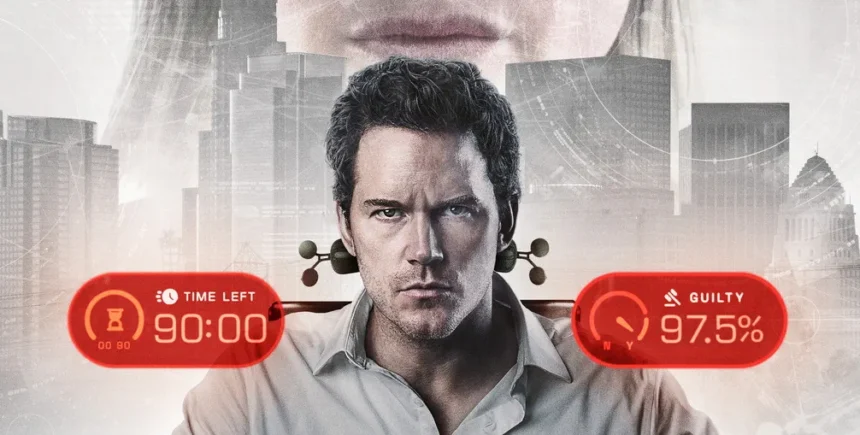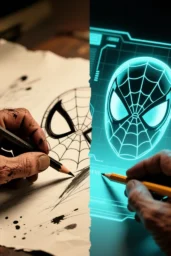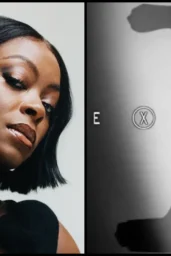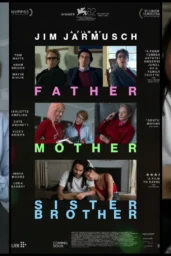The first time I saw Timur Bekmambetov’s Wanted, it was the sheer kinetic energy that stuck—Angelina Jolie bending bullets, James McAvoy finding his purpose. And then there was Chris Pratt, long before the Marvel machine, taking a keyboard to the face. Seventeen years later, the director and Pratt are back, aiming for something far more cerebral, or so the marketing suggests, with the real-time sci-fi feature, Mercy.
Amazon MGM Studios just premiered the official trailer for this January 23, 2026 release, alongside a striking poster. It’s set in a near future where capital crime has surged, and justice is meted out by advanced AI. Pratt plays a detective, now a defendant, accused of his wife’s murder. He’s got 90 minutes to convince an AI judge, championed by Rebecca Ferguson’s ominous presence, of his innocence. The stakes? Execution.
Deconstructing the Marketing: A Cold Gaze of Algorithms
The poster for Mercy is a masterclass in calculated tension, a visual statement on the future of jurisprudence. At its core, it’s a study in cold, hard light and digital judgment.
- Color & Lighting: The dominant palette is a stark, almost sterile blue-grey, a visual shorthand for technology and cold logic. This isn’t the warm, human world; it’s the chill of an algorithm’s decision. Overhead, Ferguson’s visage, ethereal and almost ghost-like, is bathed in a pale, clinical light, embodying the AI’s omnipresent, impartial gaze. Below her, Pratt is trapped in shadow and stark contrast, highlighting his vulnerable, human predicament against the backdrop of an imposing, futuristic cityscape that feels more like a circuit board than a place people live. The color grading signals a serious, perhaps bleak, vision of tomorrow.
- Composition & Framing: Pratt, strapped to a chair, dominates the lower half, a figure of desperate humanity pinned by digital metrics. The framing is tight, almost claustrophobic around him, emphasizing his limited time. Above, Ferguson’s disembodied head, large and commanding, floats like a digital deity, literally overseeing his fate. This vertical hierarchy visually reinforces the power imbalance. The city below is fragmented, almost like data points, further abstracting the world into a system.
- Typography & Taglines: The title, “MERCY,” is rendered in a sharp, almost chiseled font, its starkness contrasting with the very concept of mercy it evokes. The tagline, “THE FUTURE OF CRIMINAL JUSTICE IS ARTIFICIAL INTELLIGENCE,” is direct, chilling, and positions the film squarely in the burgeoning AI conversation. Another crucial line: “90 MINUTES TO PROVE YOUR INNOCENCE OR FACE EXECUTION” — a stark, time-sensitive ultimatum that immediately establishes the thriller’s core mechanic.
- Marketing Intent: Amazon MGM wants you to feel the cold dread of an inescapable, technological judgment. They’re selling a high-stakes, real-time thriller driven by a timely, provocative concept. The visual cues suggest a film that is visually precise, intellectually challenging, and emotionally intense, leveraging the star power of Pratt and Ferguson as human anchors in a machine-driven narrative. It’s effective, if a bit on the nose for anyone who’s been following the AI discourse.
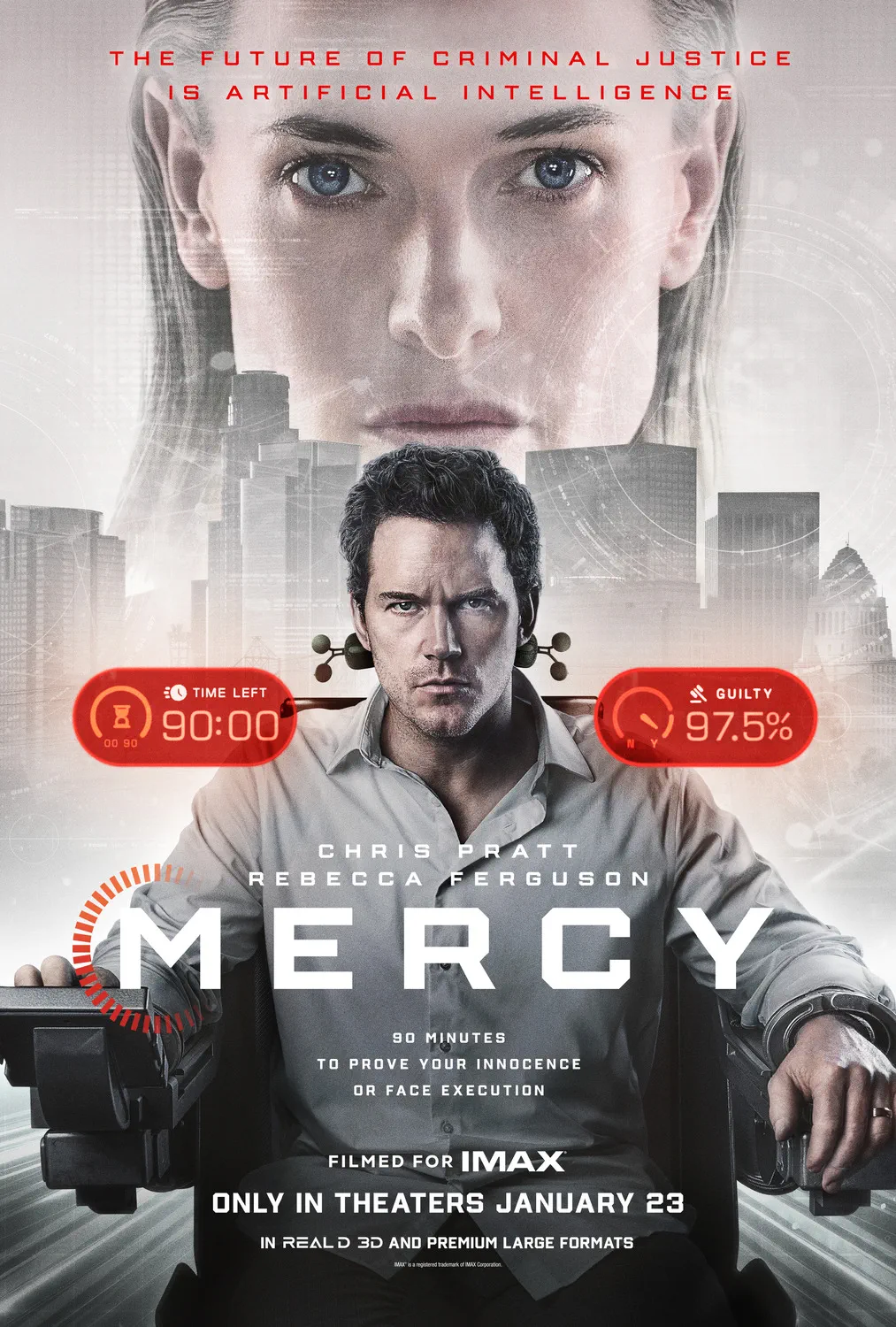
The trailer itself, first unveiled at New York Comic-Con, doubles down on this. We see Pratt’s character, a detective, accused by an AI that acts as judge, jury, and executioner. The circumstances of the crime are rapidly examined as evidence, suggesting a quick-fire legal procedural fused with sci-fi. The description hints that Pratt’s character will use an Internet connection and security camera footage to clear his name, leading one to wonder if Bekmambetov is revisiting his “Screenlife” aesthetic—a format that, for some, has already overstayed its welcome.
What’s interesting about Mercy isn’t just the timely subject matter, but its production. Filmmaker Timur Bekmambetov, known for action like Wanted and historical epics like Ben-Hur, directed this one from a screenplay by Marco Van Belle. Producer Charles Roven noted how eerily prescient the script felt: “When we first got the script, people were talking about AI, and it wasn’t happening yet. When we started talking about the movie, all of a sudden, companies were dealing with AI, and the future wasn’t definitely not far away.” The film was reportedly shot like a stage play, with Pratt mentioning 60-minute full-length takes, utilizing virtual production methods like The Volume, which employs LED panels as backdrops. It’s an intriguing blend of classic theatrical technique and cutting-edge technology.
The cast also includes Annabelle Wallis, Kali Reis (recently seen in True Detective: Night Country), Rafi Gavron, Chris Sullivan, Kenneth Choi, Kylie Rogers, and Jeff Pierre. Filmed with IMAX 3D in mind, the title will hit cinemas on January 23rd, 2026. The question remains: can Mercy deliver a truly compelling narrative within its high-concept framework, or will it be another instance of technological gimmickry overpowering genuine storytelling?
Snapshot: What You Should Know About “Mercy”
- A Timely AI Premise Set in a near-future where AI governs criminal justice, the film plunges Chris Pratt’s character into a 90-minute race against time to prove his innocence to a machine judge.
- Bekmambetov and Pratt Reunite Seventeen years after Wanted, director Timur Bekmambetov and star Chris Pratt team up again, bringing a history of dynamic filmmaking to this new sci-fi venture.
- Marketing Leans into Cold Logic Both the newly released trailer and poster emphasize a stark, technologically driven world, with Rebecca Ferguson’s AI character looming large as the arbiter of fate. The visuals are designed to evoke precision and high stakes.
- Innovative Production Techniques The film leveraged virtual production (The Volume) and was shot with ambitious 60-minute takes, aiming for a theatrical feel within a futuristic setting.
- January 2026 Release Mercy is slated for a January 23, 2026 release, filmed with IMAX 3D in mind, positioning it as an early-year blockbuster entry.
FAQ: A Deeper Look into “Mercy”
Q: Does “Mercy” risk being another Screenlife project?
A: Given director Timur Bekmambetov’s past work and the trailer hinting at the protagonist using screens and footage to prove his innocence, it’s a valid concern. Whether it can transcend the format’s limitations remains to be seen.
Q: What’s the thematic heart of the film beyond the AI hook?
A: At its core, Mercy appears to explore the human struggle for justice against an impartial, perhaps infallible, machine. It’s the classic man-versus-system, but with a terrifyingly contemporary twist, forcing us to consider if AI can truly deliver “mercy.”
Q: Is the real-time aspect of the film a gimmick or a narrative strength?
A: The 90-minute countdown is a high-pressure mechanic designed to create urgency. If executed well, it could heighten tension dramatically; if not, it risks feeling like a forced constraint on the narrative.

